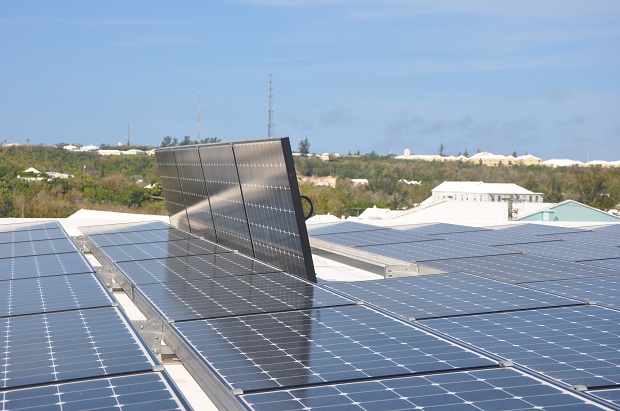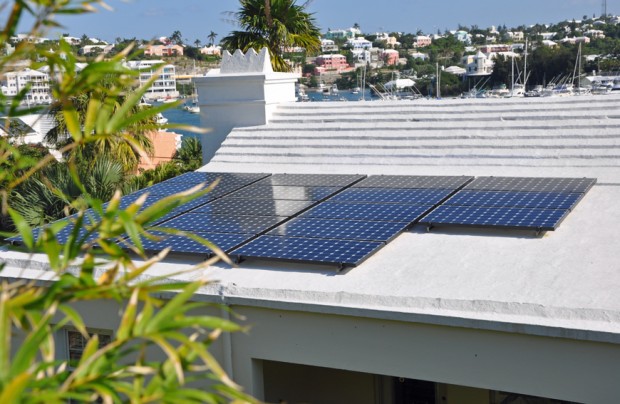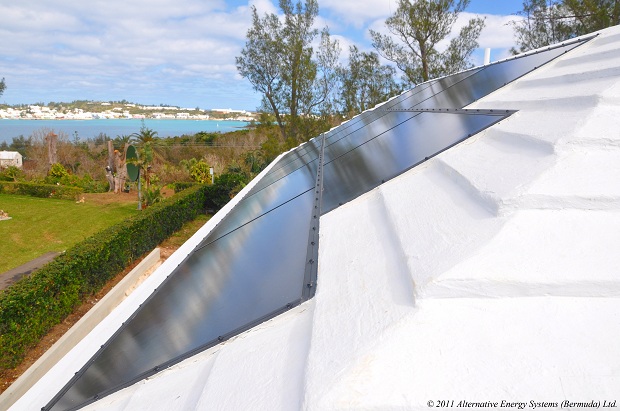Solar Power Growing In Popularity
Local company Alternative Energy Systems (Bermuda) Ltd. [AES] has installed a record 150 kilowatts of solar power systems for homes and businesses in Bermuda.
The company has seen a 38% growth in Q1 2011 over the same period over last year, indicating that alternative energy is gaining popularity on the island.
Tim Madeiros, founder and CEO, Alternative Energy Systems, said, “I am thrilled that Bermudians are embracing solar technology. I believe AES’s continued success is driven by the expertise, customer service and quality products that we deliver.”
Last month, the company completed the first commercial installation of a photovoltaic (PV) solar energy system for Lindo’s Market in Devonshire.
In addition, the company designed, engineered and installed Bermuda’s first building-integrated solar system for Stewart Minors and his wife, Minister of Business Development and Tourism Patrice Minors, in which the solar panels were adapted to Bermuda’s unique architecture and actually built into the roof structure.
Mr. Madeiros, who is a Chartered Engineer with the U.K. Council of Engineering, also feels that Bermudians may be less intimidated by the upfront costs of implementing a solar energy system because of government incentives and the interconnection policy. BELCO’s Net Metering policy enables solar customers to sell excess electricity back to the utility at the same rate that they pay for power.
“Solar offers an extremely high rate of return on the initial investment; it just makes sense from a financial perspective. Each solar owner is protected for at least 30 years from the increasing cost of oil and subsequent rise in electricity rates,” said Mr. Madeiros.
Per month, 150 kilowatts produces almost 21,000 kilowatt-hours of electricity on average that, at current prices, would cost over $8,000 a month. From an environmental perspective, the solar power generated could offset the emission of more than 260,000 pounds of dangerous pollutants including CO2, which is a major contributor to global warming.
Read More About
Category: All, Environment, News





what are prices like?
Product, Instalation etc
Anyone interested in a solar photovoltaic system can find out more about the technology and the Government’s rebates on the renewable energy page of http://www.energy.gov.bm
I am interested in the cost too. I know each installation is different but the system described above a 150 kilowatt system saves $8000 a month but what is the upfront cost per kilowatt. Or what is the ROI three years or ten years?
What’s the ROI on Fukishima or Chernobyl
How long will it take for it to pay for itself? And why doesn’t BELCO just set up a lot of these themselves? As they contribute a lot to our emission pollutants.
Solar Photovoltaic (PV) have very high start up costs so unless you have money to spare and want to help the environment it is not a wise investment. Solar PV doesn’t offer an extremely high rate of return on the initial investment, in fact it is one of the most inefficient forms of renewable energy at under 20% efficiency for most solar panels.
If you can foot the initial costs of a PV system, you will eventually benefit, but you won’t be recouping your cost until the nearly 10-15 years, almost the lifecycle of the system.
Solar thermal on the other hand has enormous benefits to Bermuda as most water heating bills make up almost a third of your electricity bill. That can be a much wiser and affordable investment in Bermuda.
Bermuda has a 0% import duty on solar systems which means that the average cost is between $6 and $8 per watt depending on how labor intensive the installation is. At these prices and with the current cost of electricity, and with the governments’ $1/watt rebate the payoff can occur as low as year 5 but is typically between year 6 and 8. The SunPower manufactured systems are the most powerful and efficient in the world and have a 25 year warranty, so after payoff the systems offer a high return on investment. Call AES for a free site assessment and basic energy audit.
The Department of Energy has several renewable energy guides available from the renewable energy page of http://www.energy.gov.bm which should answer most of these questions…